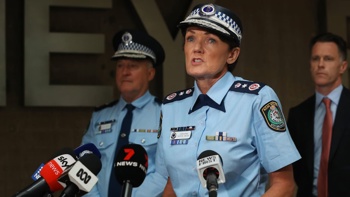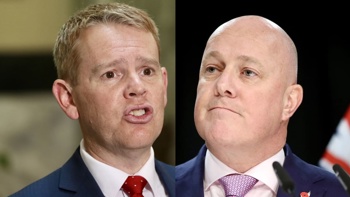It’s a funny thing, your last day.
You’re moving on but you also glance back, and for me, that means looking back over more than 20 years in the media.
I’ve been blessed with a pretty extraordinary career. I’ve travelled the world as a journalist, and at times I’ve seen the very worst of humanity, but I’ve also seen the very best too. And that not only shapes your view of the world, it shapes your life.
The moments that remain etched in my mind – and I’m sure it’s the same for you -- are the moments that I worked the hardest for.
And one of those moments came in Afghanistan. I was living in London and I had badgered my boss to send me to Kabul to cover the impact of the war on Afghan women. George Bush said that America was freeing Afghan women from the oppressive Taliban regime but I knew, like most of the media, that wasn’t the case.
In the end, my boss said "no", I couldn’t go to Afghanistan – but I wanted to do that story more than any other, so I took leave and decided I’d try and get there on my own steam. You couldn’t get an afghan visa without a media organisation endorsing you, so I lied to the afghan embassy in London and told them I was working for an American broadcaster. I’d found a copy of a letterhead on the net, wrote a letter of endorsement, and applied. Yes, I know, that’s fraud but I needed that visa and I felt the story was bigger than the crime. Somehow, I got the visa. And then I applied to the US military for security clearance and somehow I got that too. So off I went. I booked a ticket to Kabul, borrowed a flak-jacket and a helmet off a friend at ITV, and went to Afghanistan.
It was a life-changing, life-threatening and traumatic three weeks. At one stage I was up on the afghan-Pakistan border in one of two American humvee patrols. And I think we’d been travelling that dirt road for about two hours when the bomb went off. The other patrol was hit by a roadside bomb. Two were killed that day, two became double-amputees, and a third lost three limbs. It was horrific. Suddenly black hawks were above us, guiding the medi-vac helicopters in, and our humvee quickly turned around and raced back to base. There are no winners in war.
And on another night, back at base, I stood with a group of soldiers in a huge concrete pipe while the Taliban fired mortars into the compound. F-16s scrambled above us in the pitch-black and I realised what I was doing was futile. I was never going to meet afghan women in that environment so I ditched the military, went back to Kabul and hired a local man to help me with my story. He took me to a small, crude hospital in a back street of the city.
I walked into a room, and even now, I can still see her face. It will never leave me.
She was young. Maybe 12 and she was dying. She’d suffered horrific burns. Her skin was raw and weeping and her face was disfigured. She’d been forced to marry a man in his fifties, and she’d tried to commit self-immolation as a way out. She’d poured kerosene on herself and set herself on fire and now she was lying in a dark room, on dirty sheets, with no pain relief and she was dying. She was in so much pain she couldn't move -- all she could move were her eyes and they never left me. It was a distressing and life-changing moment where in an instant you realise your privilege - I was a western journalist from the free world standing beside the bed of a young girl born into the most oppressed nation on earth. Her horrific plight formed the backbone of my story, tragic and difficult and harrowing as it was to tell.
If there was a day that changed the course of my life, it was that day. Its why, as a young woman, I wanted to be a journalist. You are a voice for the voiceless.
And that’s why, two years ago, I went to the Middle East with world vision to report on the Syrian crisis and the impact it was having on women and children. It was my toughest assignment yet. How do you raise money for a cause that New Zealanders don't relate to? Refugees in the Arab world. We don’t really understand war. Or terrorism. Or Islam. Or the horrors that come from it. It’s just not our bag. But, again, instinct told me to go.
I worked for the best part of a year on World Vision's forgotten millions campaign. I returned from the Middle East and later in the year went back to Serbia as the refugee crisis hit Europe. We held a gala dinner here to fundraise. A team of us went to Beirut and ran the marathon. In the end, we raised close to $4million dollars. I had been worried that New Zealanders wouldn't give to that cause, but boy, give you did. And that’s what I talk about when I say you also see the very best of humanity when you work in the media. I’ve been back to the refugee camps on the Syrian-Lebanese border, and I’ve seen the sanitary programmes and the water tanks in place. We did that. We paid for baby kits and hygiene packs as well. It felt then, and I feel now, enormously proud to be a New Zealanders.
So what did all of that teach me? It taught me to go with my instinct. It taught me that barriers and hurdles don't necessarily mean it's futile. It just means you need to find another way but above all, it taught me to trust my instinct.
I’m buoyed by the change we’re seeing in New Zealand. Corporate social responsibility is huge. Big business is onboard helping to address issues here like child poverty, inequality and improving diversity and tolerance and understanding in the work place. It’s a good time to be living and working in this country. It’s a good time to be a New Zealander.
And so as I leave today, I guess my message is to always 'trust your gut'. Be true to yourself. Be authentic. Be aware of what you do and why.
And remember this. Kindness, compassion and empathy are among the greatest attributes on earth.
That and realising that no-one changed the world by sitting on the fence.
Take your Radio, Podcasts and Music with you









